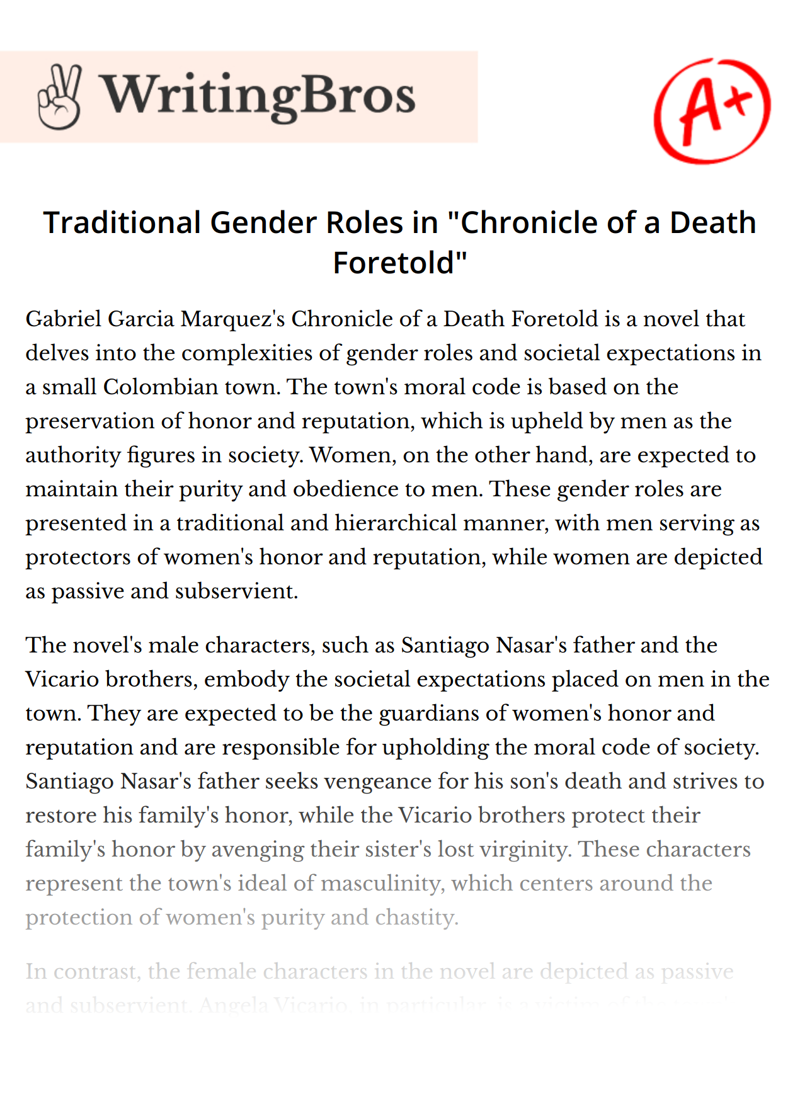Traditional Gender Roles in "Chronicle of a Death Foretold"

Gabriel Garcia Marquez's Chronicle of a Death Foretold is a novel that delves into the complexities of gender roles and societal expectations in a small Colombian town. The town's moral code is based on the preservation of honor and reputation, which is upheld by men as the authority figures in society. Women, on the other hand, are expected to maintain their purity and obedience to men. These gender roles are presented in a traditional and hierarchical manner, with men serving as protectors of women's honor and reputation, while women are depicted as passive and subservient.
The novel's male characters, such as Santiago Nasar's father and the Vicario brothers, embody the societal expectations placed on men in the town. They are expected to be the guardians of women's honor and reputation and are responsible for upholding the moral code of society. Santiago Nasar's father seeks vengeance for his son's death and strives to restore his family's honor, while the Vicario brothers protect their family's honor by avenging their sister's lost virginity. These characters represent the town's ideal of masculinity, which centers around the protection of women's purity and chastity.
In contrast, the female characters in the novel are depicted as passive and subservient. Angela Vicario, in particular, is a victim of the town's strict gender roles. She is held responsible for her own rape and forced to marry someone she does not love to restore her family's honor. Her mother, Pura Vicario, blames her for the family's disgrace and takes no action against the actual perpetrators. The novel portrays the constraints placed on women in a patriarchal society, where their actions are often controlled by the men in their lives.
However, the narrator's character challenges these traditional gender roles. He questions the idea of honor and reputation and the justification for violence against women. He demonstrates empathy towards the female characters in the novel and acknowledges their ability to make their own decisions. For example, the narrator argues that Angela should not be held responsible for her own rape, and instead, the men who committed the crime should be punished. He also acknowledges the complexity of female desire and the power dynamics between men and women in a patriarchal society.
Through the narrator's character, the novel challenges the harmful effects of strict societal norms on individual agency and freedom. It serves as a reminder of the importance of challenging traditional gender roles and the need to recognize and respect the agency of all individuals, regardless of their gender. The novel highlights the importance of empathy and understanding in overcoming the constraints of societal expectations and moving towards a more equal and just society.
In conclusion, Gabriel Garcia Marquez's Chronicle of a Death Foretold portrays the traditional and hierarchical gender roles that exist in a Colombian town. Men are expected to protect women's honor and reputation, while women are expected to be passive and obedient. However, the novel also challenges these gender roles through the narrator's character, who questions the validity of violence against women and acknowledges their agency in their actions. The novel provides a powerful commentary on the harmful effects of strict societal norms on individual agency and serves as a reminder of the importance of empathy and understanding in achieving a more just society.
Cite this Essay
To export a reference to this article please select a referencing style below

